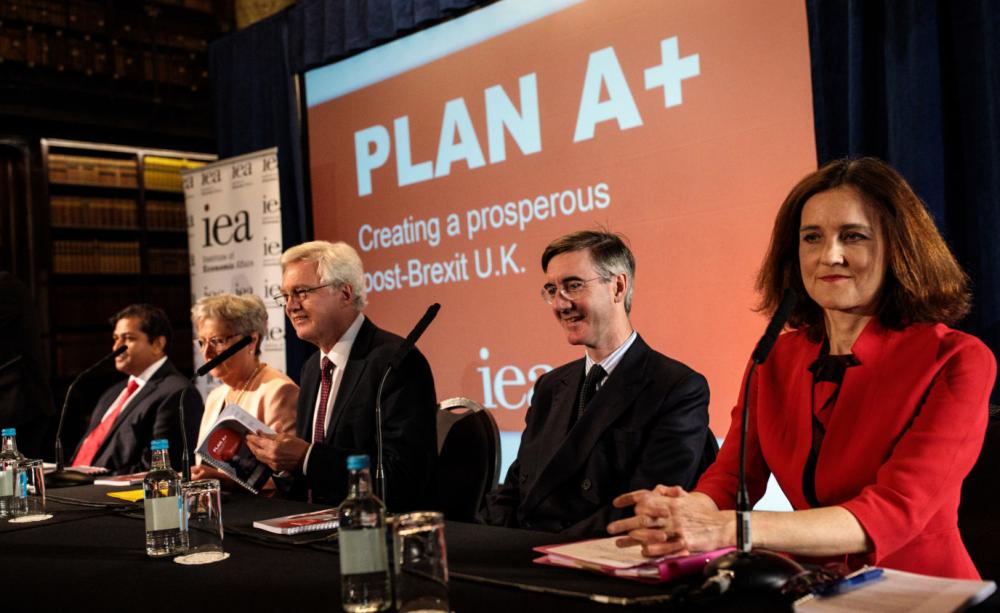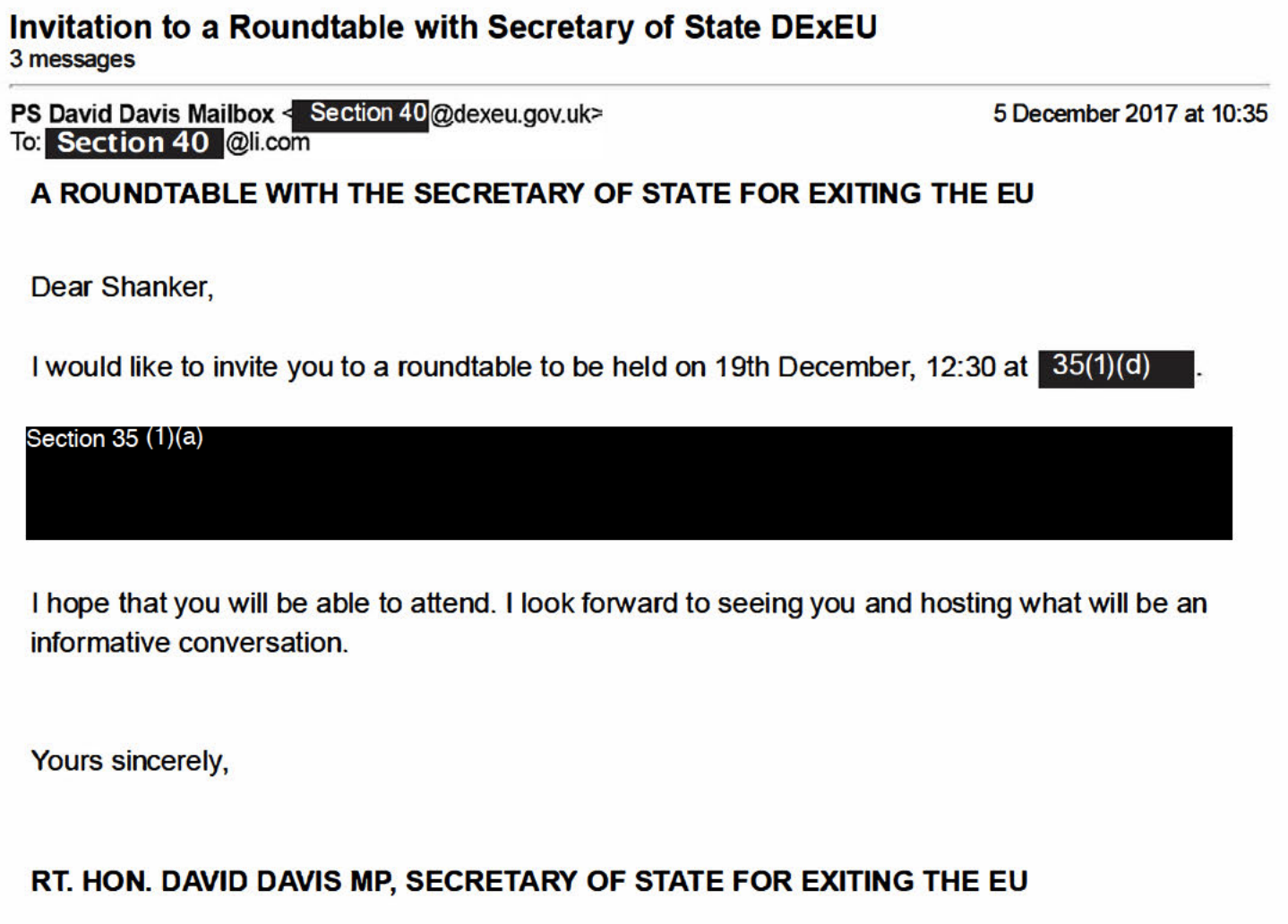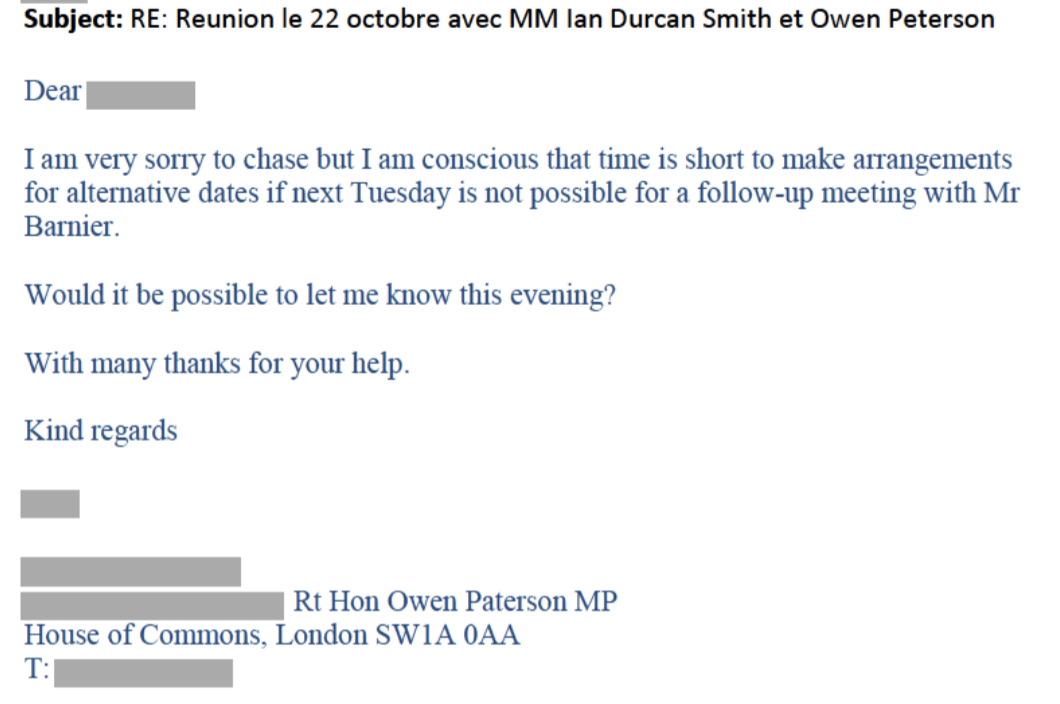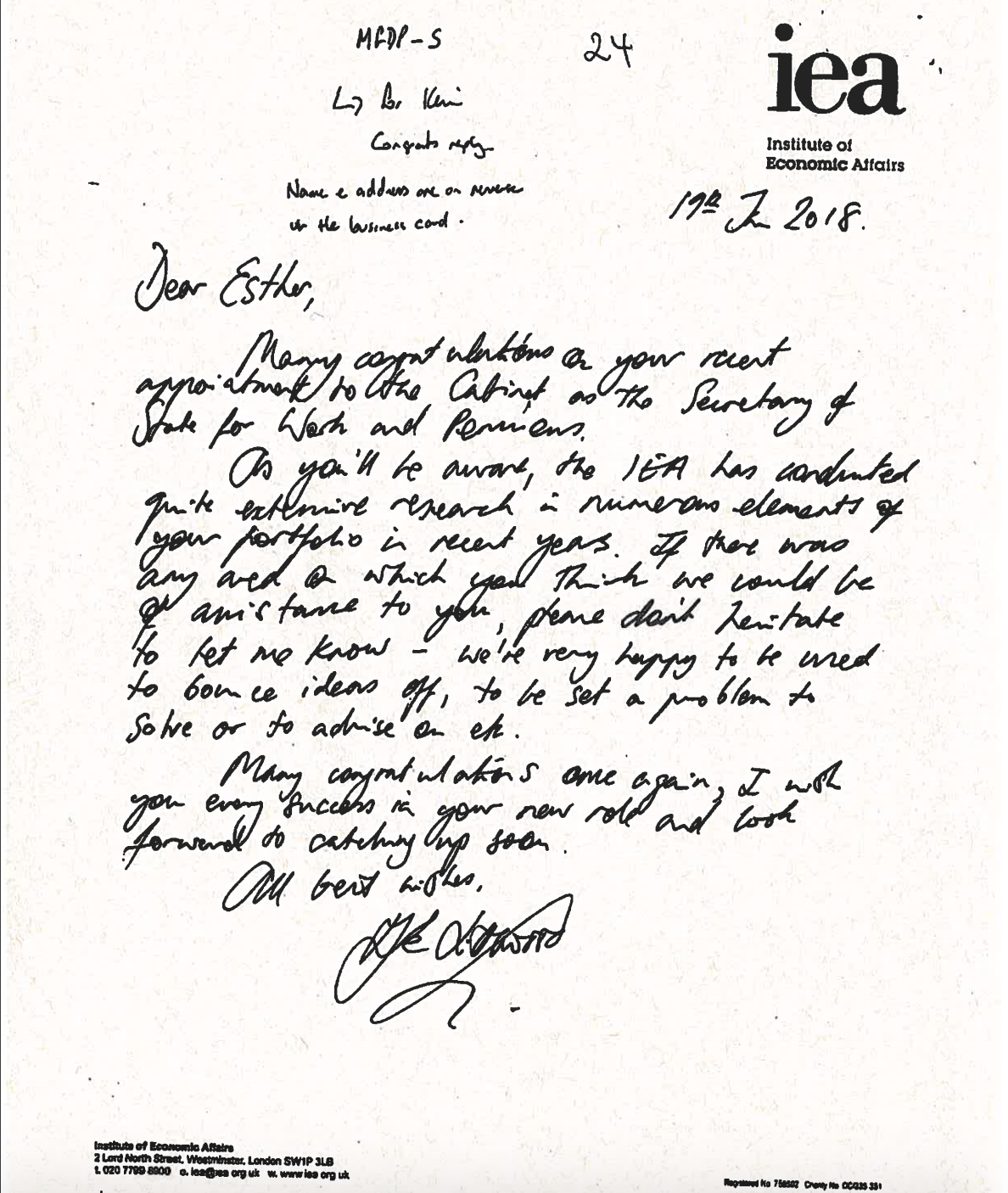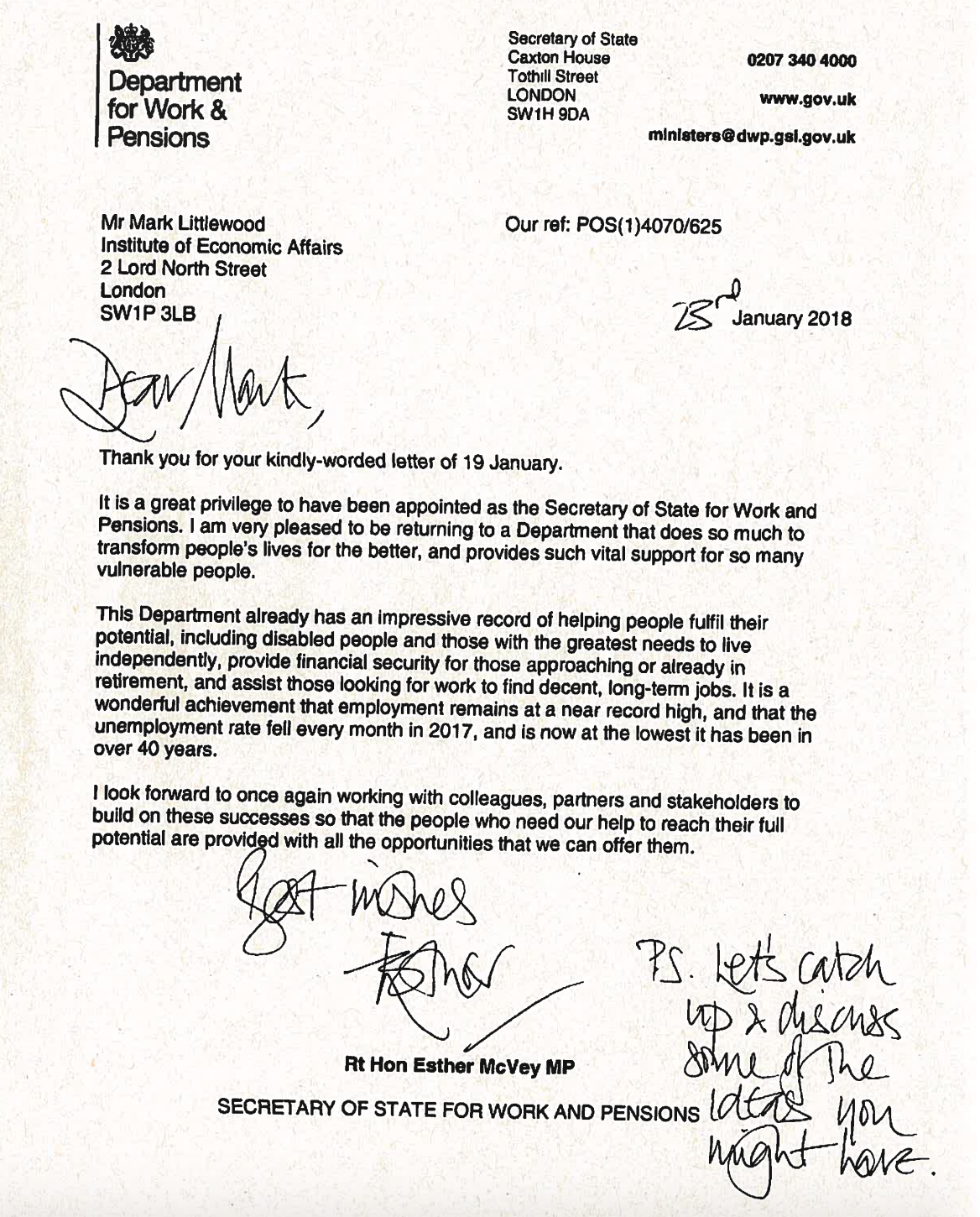Revealed: How dark money is winning ‘the Brexit influencing game’
Open Democracy | 21 February 2019
Revealed: How dark money is winning ‘the Brexit influencing game’
by Peter Geoghegan and Jenna Corderoy
The three departing Conservatives MPs pulled no punches. In a joint resignation letter that rocked Westminster on Wednesday, the trio said that the Tories were “in the grip” of the pro-Brexit European Research Group who were “now recklessly marching the country to the cliff edge of no deal".
The ERG is a secretive organisation. No one knows for certain how many members it has. Many already call it a “party within a party”. But when it comes to ideas on Brexit, Jacob Rees-Mogg’s group of Tory MPs has often looked outside its own ranks. And to one place in particular – the Institute of Economic Affairs, a right-wing think tank that does not declare its funders, and the IEA’s trade advisor, Shanker Singham.
Last month, on the same morning that Theresa May’s aides were furiously trying to corral Conservative MPs to back her doomed withdrawal bill vote, active ERG supporter Dominic Raab was holding a press conference in a quiet corner of Westminster outlining an “alternative vision” for leaving the EU. Sitting alongside the former Brexit secretary at a short wooden table was Shanker Singham.
Singham, until Brexit an unheralded trade lawyer who had spent most of his career in the US, was on stage again this month at another Westminster press conference. This time another one-time Brexit secretary, David Davis, was telling journalists that Britain could do a minimal deal with the EU then cut all tariffs to zero on goods, agricultural and food products. The event was being held by Competere, Singham’s private political consultancy.
Singham, his employers – the IEA – and their anonymous financial backers have gained remarkable influence at a crucial moment in modern British history. With Westminster in chaos and Whitehall paralysed, an unelected lobbyist working for a think tank funded by dark money has come to play a pivotal role in pushing ideas for a hard break with the EU into the heart of government. Many of those who say ‘no deal’ is ‘no problem’ cite Singham’s work.
Now, documents obtained by openDemocracy show in new detail the depth of the personal and professional connections between the IEA and the ERG and senior government ministers. The IEA is a registered charity but despite censure from the charity regulator for its pro-Brexit work the think tank’s influence on the Conservative right, especially the ERG, is huge.
Emails we’ve uncovered also show that Singham personally arranged for interest groups to meet with then Brexit minister Steve Baker and senior IEA staff had easy access to cabinet ministers. Commenting on these findings, Labour’s shadow minister for the cabinet office Jon Trickett said that the “unfettered access to decision-makers” showed that “a complete overhaul of politics is needed”.
‘The Brexit influencing game’
Just hours before the February press conference that argued for zero tariffs after Brexit, the Charity Commission had issued a formal warning to the IEA over Singham’s Brexit work. The former Washington lobbyist was invited onto Sky News afterwards all the same to explain his trade plans. That evening he appeared on Channel 4 News, where presenter Krishnan Guru-Murthy described Singham’s proposals as “unicorns and nonsense”.
Singham’s calls for the UK to elimate all tariffs are backed by many in the ERG but most economists believe such a dramatic move would lead to widespread job losses, economic damage and a serious reduction in standards across. The Times this week described the idea as "voodoo economics". Even Patrick Minford, a pro-Brexit economist and IEA trustee, has admitted that removing tariffs would mean that British car manufacturing would have to be "run down".
Nevertheless, Singham has been a near-constant presence in British media in recent weeks, often dismissing concerns about a no-deal Brexit. And as well as a constant stream of broadcast media invites for a man who refuses to reveal his paymasters, Singham has enjoyed “extraordinary” access to government ministers including Michael Gove and Boris Johnson.
Earlier this month, Singham attended a meeting at the Cabinet Office between senior ERG figures, Brexit secretary Steve Barclay and officials “from all arms of government” to discuss “alternative arrangements” for the Irish backstop. Theresa May was said to be “clearly taking this exercise seriously”.
Between them, influential, dark-money-funded lobbyists like Singham and pro-Brexit MPs have sought to play down fears about Brexit, and particularly a no-deal departure from the EU. Meanwhile, hundreds of thousands of pounds of dark money has poured into social media ads warning MPs not to “steal Brexit” and promoting the UK leaving the EU on WTO rules.
Support for a no-deal Brexit appears to be strengthening. It’s not known who is paying for either the lobbyists or the adverts, nor whether the same people or businesses are behind both.
Singham’s Brexit work has not escaped the scrutiny of regulators. The Charity Commission’s formal warning in February stated that the IEA’s alternative to May’s white paper, ‘Plan A+: Creating a Prosperous Post-Brexit UK’ – which Singham co-wrote – breached charity law by calling for Brexit to be used to deregulate finance, weaken rules on hazardous chemicals and remove rules protecting agency workers. The regulator said that the IEA risked being seen as “politically biased” after Jacob Rees-Mogg, David Davis and other pro-Brexit Tories attended the report’s launch. The charities watchdog is still investigating the IEA.
This was not the first time that Singham has been rapped over the knuckles. Last May the Charity Commission found that a Brexit paper he wrote in his previous role as trade advisor at the think tank Legatum had ‘crossed the line’ and did not meet its charitable objectives. That summer Singham was also forced to quit international trade secretary Fox’s ‘committee of experts’ after openDemocracy revealed that he had taken a job with a lobbying firm.
But rules and regulations designed to ensure political transparency are easily circumvented.
The Charity Commission forced the IEA to take down ‘Plan A+’ from its website but it is still available on the website of a political consultancy owned by Singham. When openDemocracy alerted the Charity Commission to this the watchdog said it had “issued the charity with a serious warning and expect the trustees to be cautious of any links to this publication”.
Losing his place on Liam Fox’s committee doesn’t seem to have limited the unrivalled access that Singham – and others – have to the political process. Last summer, the IEA’s director Mark Littlewood was filmed apparently boasting to an undercover journalist from Greenpeace’s investigative unit Unearthed that he could avoid having to record Singham’s presence on official data by using his name instead of the trade advisor’s on government transparency registers.
Littlewood told Unearthed that his outfit was involved in the “Brexit-influencing game”. IEA staff regularly appear as independent ‘experts’ in the British media, and have decades-long relationships with senior figures in right-wing politics on both sides of the Atlantic.
The IEA, which does not disclose its funders, is rated “highly opaque” by the accountability group Transparify. The think tank has previously received money from gambling and tobacco companies, and for promoting privatisation of the NHS. Last year, the IEA was accused of pushing “paid-for propaganda” after openDemocracy found its free schools magazine had carried articles arguing against tobacco taxes and climate change science, and in favour of NHS privatisation.
‘A Better Deal’
The 15 January press conference where Singham sat alongside Raab and Davis was held to promote the release of ‘A Better Deal and a Better Future’, a Brexit policy document written by former minister Steve Baker with the help of, among others, Shanker Singham. Within weeks ‘A Better Deal’ had had a major impact on the Brexit debate within the Conservative party: it formed the basis for the ‘Malthouse compromise’, drafted by Baker in attempt to unite warring factions of the Tory party.
That Baker and Singham were working together on Brexit was not new. The pair had been friends since the EU referendum, often meeting to talk about trade and economics while the ardently Eurosceptic Baker chaired the ERG and Singham worked for the Legatum think tank.
As Buzzfeed revealed last year, after Baker was appointed as a minister in the Department for Exiting the European Union (DExEU) in June 2017 he frequently had meetings with Singham that were not disclosed in official government transparency records. Also present was Singham’s former Legatum colleague Crawford Falconer, who works for Liam Fox’s department of international trade.
Now documents released to openDemocracy show that Singham even arranged for lobby groups to meet Baker.
The Automated Customs and International Trade Association, a trade body primarily focused on the use of computerised customs systems, wanted to talk to government after the Brexit vote. A committee member suggested that Singham could help. “He knows a lot of people,” recalls ACITA director general Des Hiscock, speaking to openDemocracy.
In January 2018, Singham emailed Baker saying “ACITA, the association of Customs Professionals would like to meet with you… Could you let me know when you can meet?” In a follow-up correspondence, Singham told the then Brexit minister that “we are working with ACITA” and requesting that he also attended the meeting.
Less than three weeks later, Baker met the ACITA alongside officials from HMRC and the Treasury. Singham, who was also present, was not employed by the trade group but he said that he had access to other government ministers.
“Some promise was made that we would see David Davis. [Singham] was trying to see David Davis to push this idea of ours forward. There was some indication that Shanker had seen him and would be able to arrange a meeting for us. Then it was ‘you know Steve Baker could see us,’” recalls Hiscock.
In July 2018, Baker resigned from government in protest at May’s Chequers plan. For ACITA nothing concrete came out of the meeting with Baker. “A lot of promises were made but by the time that we were close to getting anything, Steve Baker wasn’t there,” says Hiscock.
“[Singham] put us in contact with strange people promising wonderful things that never come to any type of fruition,” he recalls.
The Epicenter mystery
Singham’s access to Tory ministers and other leading politicians is so great it’s easy to forget he’s not himself on the government or Conservative party payroll. In fact his home base is a secretive network of right-wing think tanks.
Singham joined the free-market Legatum Institute before the EU referendum, but on 9 March 2018, after months of negative headlines about the think tank, including a series of newspaper stories about its founder and main donor Christopher Chandler’s links to Russia, it was announced that Singham had been “poached” by the IEA, taking a team of three analysts to set up a new trade and competition unit.
Two days earlier, Brexit minister Steve Baker had had dinner with an Italian libertarian think tank called the Bruno Leoni Institute. Baker’s meeting with the Leoni Institute was disclosed as part of the government transparency data, but when openDemocracy asked for further information about attendees, DExEU said the minister attended in his “personal capacity”.
Quite how a minister could have dinner with representatives of a right-wing think tank in a “personal capacity” is not clear. The Bruno Leoni Institute is part of Epicenter, a grouping of European right-wing think tanks that includes the IEA. The day after Baker had dinner with the Bruno Leoni Institute, the Italian think tank gave a talk at the IEA’s headquarters in London.
Epicenter has long been accused of being opaque about the origins of its funding. Following repeated complaints by European watchdog Corporate Europe Observatory, Epicenter declared in January 2018 that it was entirely funded by the IEA. Though, of course, we don’t know where the IEA gets the money it gives to them.
In May 2018, Baker also met with politicians from a libertarian think tank based in Oklahoma, the E Foundation, which promised to raise donations for the IEA, including from farming interests keen to ensure the UK drops EU-level regulations after Brexit. IEA director Mark Littlewood told an undercover reporter for Unearthed that Singham was “unbelievably well connected” to Brexiteer cabinet ministers including Brexit secretary Fox and environment minister Michael Gove.
Steve Baker, Turning Point and the ‘the Brexit prize’
Steve Baker has re-emerged as a powerful voice in the ERG – a group he never fully left when he became a minister – and has been among the most vocal supporters of ‘no deal’ in British politics. He has links to more radical, fringe groups, too.
In December 2016, Baker received £6,500 from the secretive Constitutional Research Council (CRC) to fund what appeared to be a Christmas party for ERG members and staff. As openDemocracy previously revealed, the CRC funnelled £435,000 to the DUP’s Brexit campaign, and its only known member, Richard Cook, was involved in illegally shipping waste internationally. Cook is also a member of the influential ERG WhatsApp group.
Baker recently described right-wing student group Turning Point UK as “the angels against the darkness of socialism” just days after one of its founders said Hitler would have been “fine” if he “just wanted to make Germany great”. (IEA digital manager Darren Grimes, who was found guilty of breaking electoral law during the Brexit referendum, is reportedly also involved in Turning Point, which is a branch of the eponymous dark money-funded US organisation.)
Baker and Singham were listed together at the Conservative party conference in September speaking on a panel about “how to create a prosperous and global Britain”, organised by the IEA and another think tank funded by anonymous sources, the Taxpayers’ Alliance. Baker also attended the launch of the IEA’s ‘Plan A+’ proposal to “deliver the Brexit prize” through radical free-trade deals and deep cuts to regulation with countries including the US.
British right-wing think tanks, including the IEA, have received millions from anonymous US donors. In October, Singham wrote to the international trade secretary saying that the UK “should take advantage of this moment” to secure a free-trade agreement with the US that would include access to “agricultural markets”. Farmers have warned that a trade deal with the US would reduce UK food standards.
David Davis and ‘errors’ in transparency records
Singham’s arguments for ‘no deal’ are gaining ground. Senior Tory Eurosceptics have said that there is ‘nothing to fear’ from leaving the EU without a deal. But none is more blithe at the prospect than former Brexit secretary David Davis. In November, Davis rejected warnings about the consequences of ‘no deal’ as “proven nonsense” and suggested that Britain could trade “more successfully” under World Trade Organization rules than as an EU member. This argument closely echoes the ‘Plan A+’ document that Singham co-authored for the IEA.
As Brexit minister, Davis was close to Singham too, often having unminuted meetings with the then Legatum trade advisor. Now new documents released to openDemocracy reveal that Davis personally invited Singham to a round table at DExEU in December 2017 – but the minister did not declare this meeting in official government transparency records.
A DExEU spokesperson confirmed that both Davis and Singham attended the event, adding: “David Davis’s name was not included in the transparency report due to an error. Since then, processes have been tightened to ensure that information is properly disclosed.”
Steve Goodrich of Transparency International said that the failure to record the meeting in Davis’s in official records “does nothing for confidence in their probity. Whether these omissions are the result of mishap or conspiracy, neither engender trust that government is truly operating out in the open.
“In the same month this engagement was not published, the prime minister had personally reminded departments of their obligations to disclose all meetings between ministers and lobbyists. Given the frequency with which this happens, one could be forgiven for thinking that they’re more than just a mistake.”
Since Davis resigned as Brexit secretary over the prime minister’s Chequers proposals, Singham has remained close to him. The IEA trade advisor accompanied Davis on a six-day trip to Oklahoma to meet US agribusiness interests in November. Davis’s trip was part-funded by US agribusiness lobbyists, keen to water down the UK’s food and farming regulations after Brexit. It’s not known who paid Singham’s costs.
In the same month, Singham appeared alongside Davis and Owen Paterson, a former Tory environment secretary, at the right-wing Heritage Foundation in Washington DC to discuss ‘Brexit and the opportunities for the US-UK trade relationship’. Last month, Edwin Feulner, the founder and former president of the Heritage Foundation, argued on its website that the UK should “pursue a no deal Brexit” to “help facilitate a highly anticipated bilateral trade deal between the United States and Britain”.
Travels with the ERG
Singham has emerged as an eminence grise for Brexiters on this side of the Atlantic, too. When the ERG’s Iain Duncan Smith and Paterson, and former Ulster Unionist Party leader David Trimble, visited Brussels last October “to discuss the Northern Ireland border” with European Commission chief negotiator Michel Barnier, Singham was by their side.
Documents released to openDemocracy show that the Brexiters presented Barnier with a copy of the ERG’s paper on the Irish border, which included no text on the backstop. The Brussels negotiator told the ERG group that he could “only negotiate with the UK government”, according to contemporaneous notes.
After the meeting, Paterson wrote to EU deputy chief negotiator Sabine Weyand asking for a follow-up meeting. Paterson said he was “more convinced than ever” that he had a “long term practical solution” to the Irish border. Almost two weeks later, Weyand replied saying that the European Commission did not believe there was any alternative to the backstop. There is no record of any subsequent meeting between the ERG and Michel Barnier.
Separate communications released to openDemocracy suggest that Singham’s relationship with the influential ERG caucus is long-standing. In November 2017, Singham wrote to Steve Baker suggesting that the then Brexit minister could come to “a session of ERG and other parliamentarians” that the Legatum trade commission was holding the following months.
openDemocracy has also mapped ERG room bookings and noticed that a number overlapped with when Singham was in proximity of Parliament and meeting government ministers. We have asked Singham whether he was also attending ERG meetings but have yet to receive a response.
‘Best wishes, Esther’
The IEA’s access to the highest levels of the British government is not confined to Singham, or to Brexit ministers. Just days after Esther McVey was appointed as minister for work and pensions, in early January 2018, the former television presenter received a handwritten congratulatory letter from Mark Littlewood. “We’re very happy to be used to bounce ideas off, to be set a problem to solve or to advise on etc,” the IEA chief wrote.
McVey replied a few days later. The new minister’s typed response was typical departmental boilerplate about “transforming lives” and “wonderful achievements”. But the letter was signed off with a far more personal tone. In her own looping handwriting, McVey’s suggested she “catch up” with Littlewood to “discuss some of the ideas you might have”.
True to her word, on 19 April 2018, McVey met with the IEA to discuss “employment-related issues”. The think tank, whose ideas greatly influenced Thatcher’s governments, has often called for sweeping cuts to social welfare and been publicly supportive of the controversial Universal Credit scheme.
Esther McVey resigned from the cabinet in November in protest at Theresa May’s Brexit deal. Many economists warn that leaving without a deal would hit the poorest regions of the UK worst but McVey and other Conservative Brexiters, many with links to the IEA, have decried such warnings as “Project Fear”.
A few days after May’s withdrawal bill defeat, McVey announced that she was launching an online advertising campaign “to explain why no deal is nothing to fear”. Meanwhile Nigel Farage’s campaign group, Leave Means Leave, has spent thousands of pounds on adverts for talks featuring the former pensions minister. We do not know where this money comes from.
McVey said of her connections with the IEA: “Any suggestions of ‘cosy relationships’ would be untrue and an incorrect description by you and openDemocracy.”
Who profits from a no-deal Brexit?
The UK’s right-wing think tank world is relatively small. Most are based in and around Westminster and hold regular meetings to agree strategy. Few give any details of who pays for their work.
These secretive organisations have played a crucial role in making the case for a ‘no deal’ Brexit – in Westminster, in the media and, by extension, across the country. Many are staffed by people who have spent years pushing for deregulation, privatisation and for the UK to leave Europe and embrace the US.
Many of those lobbying for a no-deal Brexit appear set to profit from the UK leaving the EU without a deal. ERG chair Jacob Rees-Mogg’s Somerset Capital Management investment fund opened a Dublin office last year to take advantage of an EU base. Vote Leave donor Crispin Odey, who made a fortune shorting sterling on referendum night in 2016, is betting on the pound plunging ahead of 29 March.
Tory MP Daniel Kawczynski is being paid £6,000 a month by American billionaire Tom Kaplan’s Electrum Group to give advice on gold and other resources. The price of gold is expected to rise in the event of a no-deal Brexit. Last year it was revealed that Steve Baker had invested heavily in a firm advising clients to buy gold to avoid the impact of a no-deal Brexit. Singham’s own personal political consultancy offers advice on opportunities arising from Brexit.
The IEA was founded in 1955 to promote the free-market ideas of the economist Friedrich Hayek. At the time, one of its founders, Oliver Smedley, wrote to the other, Antony Fisher, saying it was “imperative that we should give no indication in our literature that we are working to educate the public along certain lines which might be interpreted as having a political bias”.
Over the decades, the IEA has often influenced Tory policy. Brexit, and particularly the prospect of no deal, offers the think tank and its anonymous backers the ultimate opportunity: to remake Britain in line with its ideological and corporate interests.
Tamasin Cave of transparency advocacy group Spinwatch said: “We know next to nothing about the corporate lobbying activity that’s taking place around Brexit. When it comes to Shanker Singham, not only is there little public scrutiny of his contacts with ministers, we have no idea which corporate and financial interests he is working for. Who is funding his lobbying for the hardest of Brexits?”
Shanker Singham told openDemocracy: "I moved back to the UK in 2016 after spending more than 20 years in the US working on international trade policy. Given the size of the challenge before us as the UK leaves the EU, I am pleased to be able to offer my expertise in trade policy to the government and parliament."
IEA spokeswoman Nerissa Chesterfield said: “Our Director General and other IEA representatives will happily meet with any ministers, MPs, policymakers and stakeholders of all stripes and persuasions, who wish to hear our ideas.”
Chesterfield added that “because of the quality of our research we are regularly asked by policymakers of all kinds from all parties for our thoughts and advice on relevant subject areas… it would be extraordinary if we were to decline these requests. Whether the policymakers in question take up our ideas is down to them.”
For hyperlinks read article on original page




